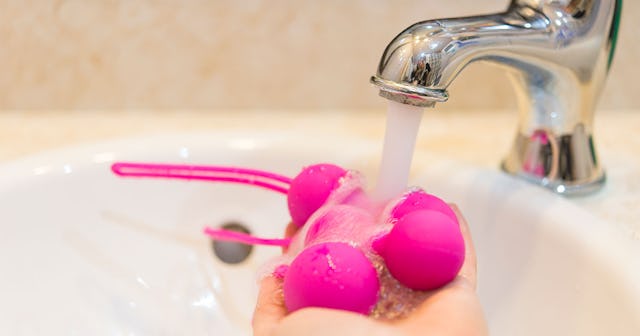7 Sex Hygiene Rules That Should Be Followed

Sex is far from a sterile situation. Swapping body fluids with someone else isn’t exactly sanitary, nor is putting something of yours into someone else’s somewhere. Sex is fun and messy and germy. We don’t share toothbrushes with our partners but we will share each other’s spit. The rules are weird. Sex can be the best kind of dirty, but it can also give us unwanted infections, irritations, and other dangerous turnoffs if we’re not careful. In order to keep ourselves healthy — even if masturbating alone — we need to follow a few hygiene rules when it comes to the before, during, and after stages of sex. And remember, consent is sexy and communication is key to great and safe sex.
Get Tested For Sexually Transmitted Infections
If you have or are open to multiple sexual partners, get tested regularly for sexually transmitted infections (STIs) and ask that your partners do too. Using condoms and dental dams significantly reduce the risk of contracting an infection, but nothing is guaranteed. Regular exams can help you catch an infection early and before it can do long-term damage. And if you do have an infection, be honest with your partner or date if you think things could become physical.
Wash Your Hands … And Your Junk
This may seem pretty simple, but soap and water does wonders for removing bacteria from your body, specifically your hands, penis, and anus. Bacteria can cause yeast infections and urinary tract infections (UTIs) for folks with vaginas (someone with a penis can also get a UTI if anal play is involved), so before touching the vulva or incorporating digital or penial penetration into your sexy time, do a quick wash and dry. Folks with uncircumcised penises need to be mindful to clean under the foreskin because bacteria can build up if not properly cleaned. Infections aside, think about all of the places your hands have been and the stew that your junk has been sitting in all day. Ew.
See Something, Say Something
You or your partner may be the only one looking at certain body parts during sex, so if you see something that looks off — redness, a lump, a rash, or a tear — don’t ignore it.
Keep Your Toys Clean
There is no shame in the sex toy game, but toys need to be properly cleaned and stored before and after use. Toys can spread infections and bacteria in the same ways body parts can. This is why if you are swapping the same toy with a partner, you should either wash it between users or put a condom on it. Check to see what the manufacturer recommends for a cleaning routine, but usually soap and water will do the trick. When you are cleaning your toys, be sure to clean ridges or uneven surfaces thoroughly and keep an eye out for tears. And when you are done using and washing your toys, be sure to store them in a protective bag or the box it came in. Not that box … the package. Oh, forget it. Clean your toys when you’re done playing, then clean them again the next time you get them out.
Once You Go To The Anus, You Can’t Go Anywhere Else
If anal play is fun for you and your partner(s) or something you are curious about trying, have at it. But the rectum has a lot of infection-causing bacteria. “The rectum isn’t a ‘dirty’ place, but it has different bacteria than the vagina does. Introducing those bacteria can upset the balance of the vagina, leading to infection,” says sex therapist Vanessa Marin. To reduce the risk of infection, never go from anus to vagina, whether it’s with the mouth, finger, penis, or toy until you have changed the condom or dental dam, cleaned the toy, or used soap and water to clean whatever you used for anal play.
Pee After Sex
Peeing after sex, whether alone or if vaginal penetration has happened or not, is another step you can take to flush away whatever bacteria may have accumulated near the urethra before it can make its way to the bladder and cause a UTI or other infection. For folks with a penis, peeing after sex is not as critical but still important. Penis owners are more likely to get a prostate infection (if they have a prostate) if anal sex is involved. Wearing a condom is the best way to reduce this risk, but if you don’t use protection while having anal sex, be sure to urinate the E.coli from your schlong and wash up with soap and water.
Stay Hydrated
Speaking of water, we should all be drinking more of it. But proper hydration improves our sex life too because dehydration can cause erectile dysfunction and vaginal dryness. The image of those two scenarios meeting seems less than ideal. Vaginal dryness can cause itchiness and irritation; lube can help and should already be a bedside staple. Adding lube to your sex life can reduce friction and decrease the chance of injury or a condom break, both of which increase your risk of a STI. Lube can be water, oil, or silicone based, so be sure to see what you and your partner prefer; if you are using lube with a sex toy, make sure it’s compatible with the material.
Hopefully these are already rules you know and use, so consider them a reminder and not a mood killer. Honestly, no one has the time or desire for a UTI or hepatitis. Expect your sexual partners to use these rules too; consenting to STI checks, condoms, clean hands, and washed toys is just as important as consenting to the acts that will follow.
This article was originally published on